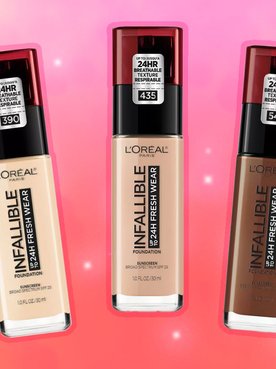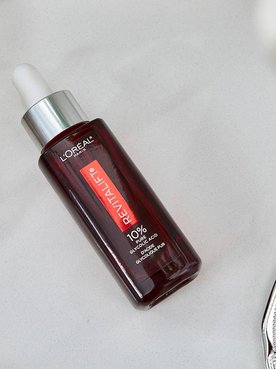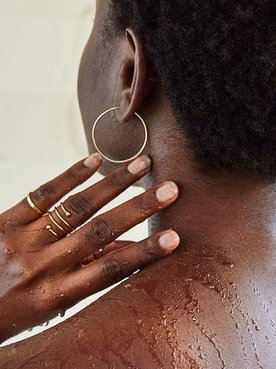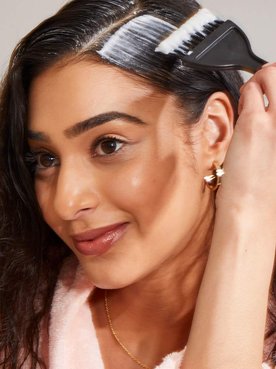We might consider our skin type when it comes to what type of facial cleanser or moisturizer we use, and it might even influence the type of foundation we reach for when we want to perfect a makeup look. But do you ever consider the skin on your scalp when you’re choosing your hair care products? Your scalp type exists, and it could affect your hair goals more than you think.
Not sure what your scalp type is or where to even begin to find out. Read on for the 4-1-1 on how to determine your scalp type, and the products that you might consider reaching for to care for it.
How To Determine Your Scalp Type
Just like with the skin on your face, it’s best to consult with a professional or board-certified dermatologist to help best determine the type of skin you’re dealing with on your scalp. But there are some traits to look out for that can help you identify your scalp type when you can’t get to an expert. Check them out below.
How To Tell If You Have A Dry Scalp
Do you find that your scalp is often itchy and irritated? Is your scalp often riddled with dusty flecks of skin? If you’ve answered yes to these questions, you’re likely dealing with a dry scalp type. Not to be mistaken with dandruff, dry scalp is marked by a lack of moisture. According to the National Center for Biotechnology Information, sebaceous glands exist in the skin to lubricate it and help seal in moisture anywhere there are hair follicles. They do this through the production of sebum. A dry scalp produces too little sebum, causing irritated skin that flakes, and often can be a cause of dry hair (since sebum from the scalp helps to moisturize the hair).
How To Tell If You Have An Oily Scalp
This one might seem easier to determine but you could be mistaking product buildup for oil. What’s more, an oily scalp can be prone to dandruff, which many think is an issue for dry scalp types. If you find your hair noticeably greasy throughout the day even after you’ve washed it, so much so that your hair is weighed down and flat, you might have an oily scalp. Overactive sebaceous glands on your scalp can lead to excess sebum, making your scalp and, effectively, your hair, oily. And if you respond by overwashing your strands, that can lead your scalp to produce even more oil to replace what’s been stripped. While you want your scalp to produce some oil, too much oil can make it difficult to nourish and style your hair.
How To Tell If You Have An Acne-Prone Scalp
Of course you’re familiar with face acne, you might even be acquainted with back acne (backne) and chest acne, but acne on your scalp? Yup, it’s a real thing. And not only can scalp acne be uncomfortable and annoying to deal with, it could be caused by several factors, including hormones and excess oil production. According to the Mayo Clinic, hormonal changes during your teen years can cause the skin to produce more oil, including on the scalp. When that oil mixes with dead skin cells and clogs hair follicles, it can become a breakout. So if you have an oily scalp that often leads to small red bumps on your head, you might have an acne-prone scalp.
How To Tell If You Have A Sensitive Scalp
Just as you can have sensitive skin on your face, you can have sensitive skin on your scalp. According to a study from the National Center for Biotechnology Information, signs of a sensitive scalp can include anything from prickling, burning, stinging, dry scalp, and discomfort.You may have noticed some tenderness or soreness while combing or brushing your hair if you have a sensitive scalp. This can cause you to avoid washing, moisturizing and styling your hair regularly.
How To Care For Your Scalp Type
Fortunately, whether you have a dry, oily, sensitive or an acne-prone scalp, there’s a hair care system that will help you properly care for your scalp and its unique concerns. While determining your scalp type is an important step to getting your scalp and your hair the nourishment they need to stay looking healthy, it’s just the beginning. If you find that you’re dealing with excess dryness, inflammation, or other issues on your scalp, seek out the help of a board-certified dermatologist or licensed trichologist to better understand what’s going on with your scalp and to create a treatment plan to address your specific concerns.
The L’Oréal Paris EverPure Sulfate Free Scalp Care + Detox Shampoo and the L’Oréal Paris Sulfate Free Scalp Care + Detox Conditioner deeply cleanses, relieving the scalp of dirt, product buildup, flakes and oil – all while being gentle on hair (even color-treated tresses). Use the system in conjunction with the L’Oréal Paris EverPure Sulfate-Free Scalp Care + Detox Scrub, which removes unwanted impurities, excess oil, and product buildup to give your scalp an exfoliated and purified base for your complete hair care routine.
Next: Does Your Scalp Routine Need A Serum?
Written by: Shalwah Evans, Photography: Matthew Zach, Senior Art Director: Melissa San Vicente-Landestoy, Associate Creative Producer: Becca Solovay





